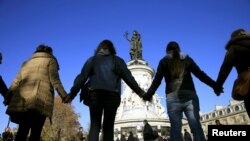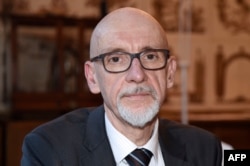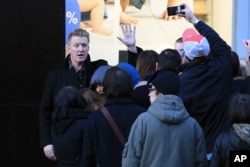After terrorists stormed the Bataclan in Paris on November 13, Georges Salines spent frantic hours searching for the whereabouts of his daughter Lola, 28, one of hundreds attending a concert that ended in a bloodbath.
With an information telephone line saturated, Salines ended up calling city hospitals, which were struggling to cope with the influx of casualties from the theater and from other near-simultaneous jihadist attacks across the French capital.
News about Lola finally arrived via Twitter: dead.
Salines described his odyssey to lawmakers as France’s lower house opened an inquiry into the government’s response to the terror threat since the first set of Paris attacks, in January 2015. Set up at the request of France’s conservative opposition Republicans, the commission is expected to deliver its findings by July.
“We have a thousand questions and expect answers,” Salines told the commission, which began its probe Monday by hearing often scathing testimony from victims groups and their lawyers.
Along with the much-awaited return to Paris of American rock band Eagles of Death Metal to “finish” their aborted concert, the parliamentary investigation is bringing back painful memories — but also helping some people move forward.
“What’s important is that everyone has a clear view of what happened,” Salines said later in an interview. “We must find solutions together.”
Claim by IS
The Islamic State militant group claimed responsibility for the assaults that left 130 dead and 350 wounded. The assailants have been identified as mostly French and Belgian nationals.
In their testimony, victims groups and their lawyers described frustrating efforts to reach police and late, sometimes callous delivery of information about loved ones.
Caroline Langlade, holed up in a side room of the Bataclan with other hostages as terrorists picked off concertgoers, told deputies about how she tried calling the police on her cellphone. She was told to speak louder and, as she tried to explain her situation, was hung up on.
“I had to call my mother in [the French town of] Nancy so she could communicate the information to the police there,” she said.
Salines and Langlade are part of two separate support networks that have been set up in recent weeks. One, November 13: Brotherhood and Truth, includes both survivors and victims’ families. Salines is president of the group, which is helping members wade through the bureaucracy of receiving state support and compensation. It also wants to become a civil party in a judicial probe into the assaults.
A second, Life for Paris, has a website and a Facebook page. Most of its members are survivors of the Bataclan attacks, who get together for drinks and exchange information and support.
Scenes From Paris After the Deadly Terror Attacks
Part of healing process
For many, understanding every detail of the attacks — how they could happen, how they were carried out and the fate of the assailants — is an essential step in the healing process.
“I don’t think we’ll have the whole truth, but maybe we’ll have a little part of the truth,” said Emmanuel Domenach, 29, who survived the Bataclan assault and is a member of the November 13 group.
“People want to know what happened to their sons, their brothers, their dads. How they died. And how young French and Belgians can grow up to kill other young people,” he said.
Domenach was among many survivors to attend the return concert of Eagles of Death Metal on Wednesday. This time, the American rock band did not play at the Bataclan — which is set to reopen later this year — but rather at the trendy Olympia concert hall under tight security.
“I was a bit afraid the concert would be too sad, that it would be about November 13, but the group gave us 2½ hours of a really good show,” he said.
Domenach escaped from the Bataclan with the help of a security guard. It helped that he was in the front of the concert hall; the terrorists entered from the back. He lost his glasses in the mayhem and emerged with his T-shirt soaked in blood.
Today, he is fearful about taking the subway or going to movies. He has been fighting depression, his mind wandering back to the blood-soaked events. Recently, however, things are getting better.
“This time I enjoyed the moment,” he said of the Olympia concert. "Although I still had thoughts about the people at the Bataclan, especially a girl dancing near me who is now dead. I saw people like her in the audience.”
Too sad for some
Other survivors chose not to attend, and some emerged in tears. “I think they were not ready — maybe still too sad,” Domenach said.
Salines also attended with family and a friend of his daughters who had also been at the Bataclan.
“The music isn’t exactly my cup of tea, but it’s a good group and a good concert,” he said.
The November 13 group will be closely following the parliamentary investigation. Members hope to meet with French President Francois Hollande.
“We want to discuss what failed and what needs to be done so these kinds of attacks don’t happen again,” Salines said.
Law-and-order answers are not enough, he said. “On the contrary,” he said, “it’s absolutely necessary to understand what drives these young people to take up arms against their own country."







